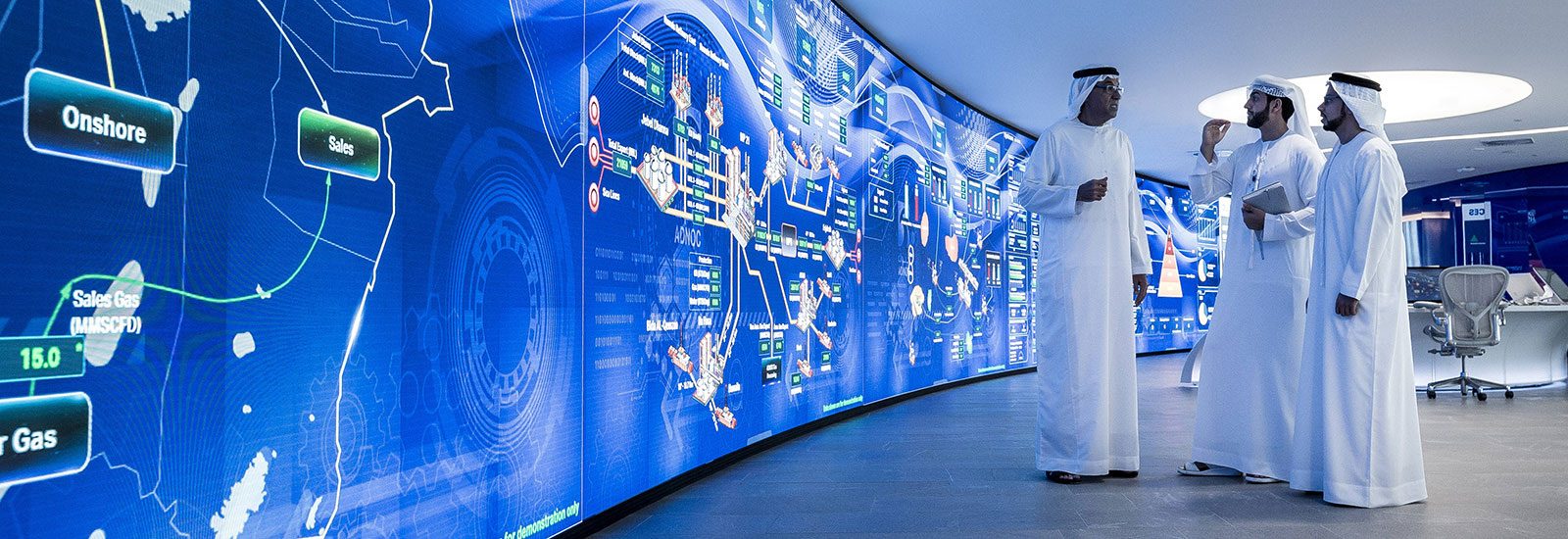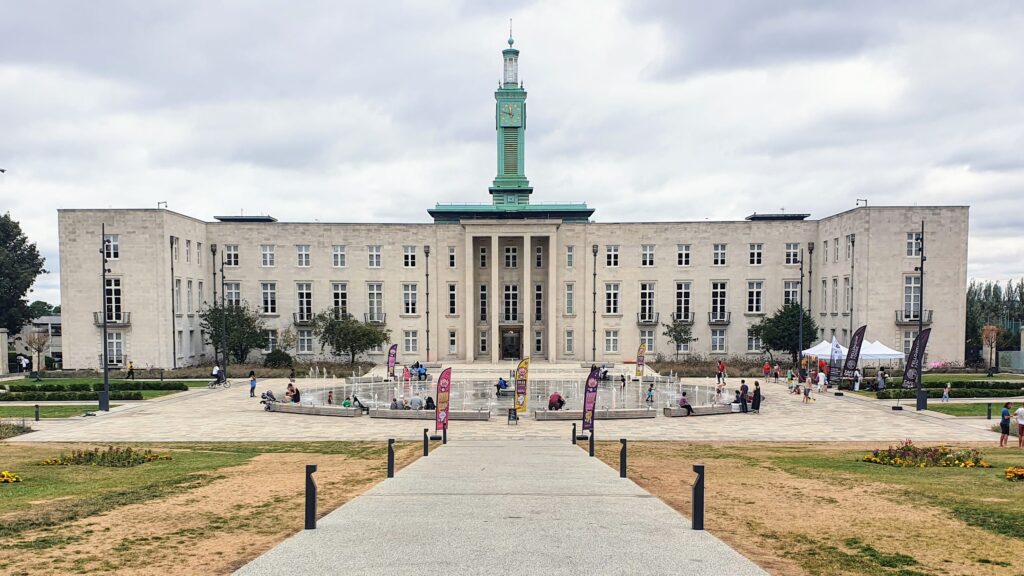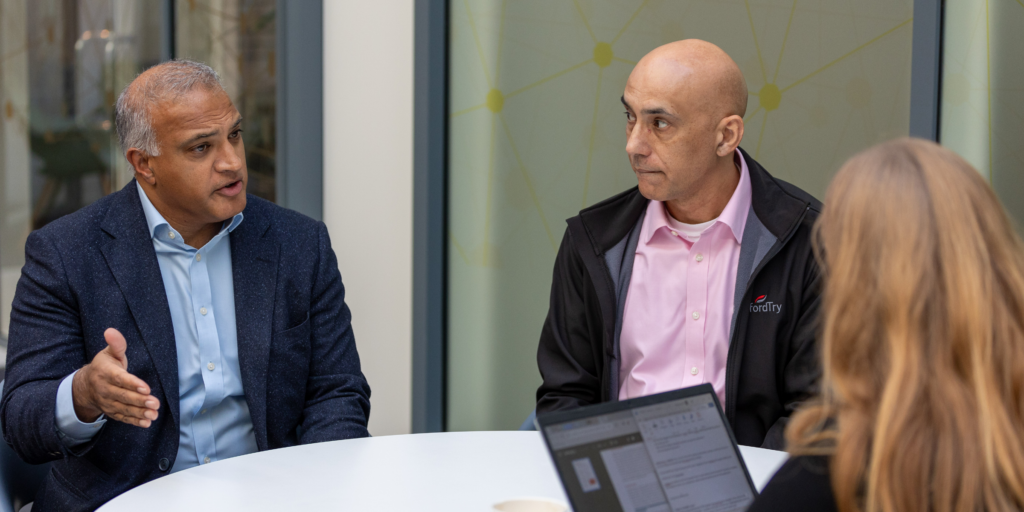ADNOC (Abu Dhabi National Oil Company) has been one of the key drivers for the UAE’s economy for the last 40 years. It is the twelfth largest oil producer in the world generating in excess of 3 million barrels per day and has the seventh largest reserves globally – an estimated 100 billion barrels. Paul Esherwood spoke to Abdul Nasser Al Mughairbi, senior vice president of digital at ADNOC, about its digital strategy and journey towards a more sustainable future.
ADNOC is the most progressive of all the Middle East oil and gas companies and is currently implementing more than 200 separate sustainability and ESG (environmental, social and governance) programmes across its value chain. Its carbon capture and utilisation storage (CCUS) programme started back in 2009 and has the capacity to store 800,000 tonnes of CO2 each year with a plan to increase capacity by a factor of six times with two new CCUS facilities. It is also aggressively adopting digital technologies across both the upstream and downstream businesses, all of which feed into its incredibly impressive ‘Panorama’ centre, pictured on the previous pages. The Panorama centre houses a 50 metre screen that allows visualisation of more than 120 dashboards and over 200,000 data points from across the enterprise. Historically, ADNOC operated as 14 separate companies covering upstream, midstream and downstream. The Panorama brings together all operating units into one single visualisation in order to identify value optimisation opportunities and a single source of reference for senior managers.
The facility is powered by Aveva’s unified supply chain management solution which is used to run techno-economic optimisation scenarios and ‘value chain optimisation’. The company claims that just one run of the full system capabilities can save between $60m and $100m through AI power optimisations. ADNOC also has more than 10 million sensors across its facilities which all feed into the Panorama and allow finely tuned predictive maintenance scenarios to be visualised. The predictive maintenance capability is powered by Honeywell’s asset-monitoring and predictive analytics platform and provides a centralised view of thousands of assets across ADNOC’s upstream and downstream operations. The platform leverages machine learning and digital twins to help predict equipment stoppages, reduce unplanned equipment maintenance and downtime, increase reliability and safety, and enable substantial cost savings.
Abdul Nasser Al Mughairbi, senior vice president of digital at ADNOC said: “With digital technology we can really optimise costs and generate value for money. It’s not always about reducing the costs, it’s how much value you can generate. When we do simulation modelling we are 14 companies on one single value chain. If one unit shuts down for maintenance it impacts the upstream and the downstream. Aligning these turnarounds using simulation and AI not only tells you the best way, it gives you alternatives, and gives you the value generated by those decisions. Unless I generate value repeatedly, I don’t have the license to operate. It’s as simple as that.”
Sustainability is a key part of our journey. Our reservoir is going to last for a long time, but it won’t last forever. Remember, we operate in Abu Dhabi and at the same time we live in Abu Dhabi. We don’t have a license or a concession to operate in other countries. We live and work in the same environment so we need to be sustainable and responsible
Al Mughairbi
Strategy 2030 – digital transformation and sustainability
ADNOC’s digital transformation journey started in 2017 underpinned by ‘Strategy 2030’ – a bold plan that would not only transform ADNOC into a digital-first company but would also see the enterprise remodelled from an oil and gas business into a modern and sustainable energy company. Despite popular misconceptions, The UAE is a very progressive and forward-thinking country and embracing change – from both a technological perspective and in its broader culture – was something that came relatively easily.
Al Mughairbi said: “For us it was much easier for two main factors. Firstly, we have a younger workforce and they are all very used to working with modern technology and dealing with change. Secondly, change is a constant factor if you live in the UAE. The city changes, the people change. We live in a society where 80 percent are ex-pats so we meet different cultures all the time. We’re very tolerant and accepting of change so it wasn’t really difficult for us to embrace change in our business. We are still a traditional country. You see us always wearing our national dress and that is very important to us. But we’re also very progressive and most of the change is driven by the young people. In my team I’m the oldest one, the rest are in their 30s and they’re all highly qualified with PhDs. They’re amazing UAE nationals that are very capable and they’re the ones who are driving us really. It’s the young pushing us to change.”
As the market changed, as the world changed, we realised that there’s other things to consider and a new vision emerged. That vision came from the senior government and now we will celebrate when the last barrel of oil is produced and sold.
But it’s not just the relatively young workforce and smart graduates who have been driving change across Abu Dhabi. ADNOC’s own CEO, Dr Sultan Al Jaber has been a key influencer in the new direction for the company and its efforts towards a more profitable and sustainable future. He holds a BSc in Chemical Engineering from the University of Southern California, a PhD in business and economics from Coventry University right here in the UK and an MBA from the California State University at Los Angeles. He is also a staunch advocate of alternative energy and sustainable development and under his stewardship ADNOC has invested significantly into remodelling the business into a progressive and digital energy provider.
Al Mughairbi said: “Dr Sultan (Al Jaber) has had a huge influence on the direction we have taken. When we first started this journey, after just a few months he had a lot of questions and wanted to know what we were doing right, what we did wrong, and how can we do better? He looked at everything from the human capital to the technical workstreams and wanted a complete overview of everything that we were doing across the 14 businesses. One of the issues that we faced was information availability and information accuracy and multiple versions of the truth. In reality they were all truths. There are multiple versions, but they’re all true. It depends on what space and time and from which angle you’re looking at that question, where you answer. We developed the Panorama to be the single version of the truth – the one place that our engineers, our analysts and our CEO could see everything that we do, in real-time, across the whole value chain.”
Thirty years ago we had a vision that it would be ADNOC that sold the last barrel of oil. We wanted our reservoir to last forever and we thought our oil would sustain the world. That was a strategy that led to a conservative approach to reservoir management, but today the vision is very different. It’s probably not going to be us selling the last barrel of oil. When we sell our last barrel of oil that will mean we have completed our journey to diversify.
SAP and cloud
ADNOC’s underlying technology is SAP S/4HANA with all 14 operating units either being currently live or transitioning to S/4. Previously, there had been a mix of other vendors supplying ERP and infrastructure services but the current direction of travel is to move everything to SAP. Hosting had always been a key consideration for ADNOC – not because of security concerns – but due to data sovereignty – and the sheer volume of data that was now being collected and analysed necessitated a shift to the public cloud – albeit, likely in a private environment.
Al Mughairbi said: “We believe that cloud environments are very secure in terms of cyber security, better than anybody that you can hire to do the internal site. But in terms of data jurisdictions and data ownership, that’s our concern. Having a cloud in the UAE is very important to us. Microsoft has built one and SAP is also building one. There are quite a few happening in the area and that will make us move into that cloud. The cost of doing everything on your local servers is very high. Also, most of the software that we want to use is designed for cloud – to run the type of workloads that we are looking at, cloud is the obvious choice for us.”
At the time of the interview SAP may have been planning a UAE data centre but its recent announcement to move out of infrastructure and focus on its applications business, coupled with a new partnership with Microsoft should mean that ADNOC’s cloud ambitions can still be realised.
Sustainability
When you think about any of the Gulf states you naturally think of oil. You don’t necessarily think of renewable energy, sustainability and environmental considerations. But that’s the Middle East oil companies of old – today many of the region’s producers are amongst the most sustainable and responsible on the global stage, and ADNOC is at the head of the field when it comes to environmental considerations and developing a sustainable business model.




